This article originally appeared in Fortune on April 5, 2017.
While the Congressional efforts to reform America’s health care system fell apart last month, the Trump Administration can learn important lessons for its next legislative battle: corporate tax reform. Here are five key guidelines.
First, don’t trust House Republicans to draft a bill.
House Republicans could not muster a majority of their own party for their healthcare bill, so the White House should draft its own corporate tax bill — without the border adjustment tax (BAT) that House Speaker Paul Ryan has advocated. Although the BAT would exempt from US corporate taxes all exports by US companies, it would be fiercely opposed by US retailers and local manufacturers, since it would end their ability to deduct the cost of imported goods or services from their corporate tax payments. What’s more, these opponents do not believe the economists who claim that the BAT would send the price of imports downward by 20% — because these economists predict the US dollar will appreciate by an equivalent amount.
Moreover, House Republicans have not come to grips with the broader implications of the BAT. If the US dollar appreciates another 20% from its already high level, what would happen to the trillions of dollars of foreign assets held by US investors? And will Congress overcome the strong argument of our foreign allies that the unusual structure of the BAT discriminates against imports and therefore violates the rules of the World Trade Organization?
Second, try to win over moderate Democrats
Given the slim majorities and ideological divisions in the Republican ranks, the White House should not ignore moderate Democrats as it did in healthcare reform. Some Democrats support the repatriation of the more than $2 trillion in past foreign profits of US multinationals held abroad, but they do not want to repeat the tax holiday of 2004. When US multinationals were then allowed to bring back their past foreign profits at a low tax rate, they mainly distributed such profits to their shareholders instead of hiring more US workers.
To attract some Democratic votes, President Trump should link his tax bill to the bipartisan objective of repairing American infrastructure. The Trump campaign proposed a 10% tax on past foreign profits held abroad by US multinationals, which could then at their discretion repatriate the remaining profits (without additional taxes ). Trump could announce that the approximately $150 billion to $200 billion, generated by this tax over 10 years, would be dedicated to government investment in US infrastructure.
Third, don’t leave America much deeper in debt.
A significant block of Republicans in Congress would oppose any major legislation, healthcare or tax reform, if it resulted in a sharp increase in the national debt. Yet the Trump campaign proposed a reduction in the corporate tax rate from 35% to 15%. This 15% rate is a nonstarter, because it would increase the national debt by $2 trillion to $3 trillion over the next decade, and more if that rate were applied to the business income of partnerships.
To be competitive with most industrialized countries, the US needs a corporate tax rate in the range of 20% to 25% — with a US tax credit for corporate taxes paid to a foreign country. Such a lower tax rate would be partly financed by closing and narrowing existing corporate tax preferences. Most importantly, Trump would raise considerable revenue by his campaign proposal to limit corporate deductions for interest – which would also correct the Code’s bias in favor of debt over equity.
Fourth, bite the bullet on the tough issues in tax reform.
In contrast to healthcare reform, some of the toughest issues in tax reform are international – specifically, the billions of foreign profits that have been parked by US multinationals in tax havens. In places like Bermuda or the Cayman Islands, these foreign profits are subject to minimal local taxes, while the US taxes on these foreign profits can be indefinitely deferred. To end these tax avoidance schemes, the original Trump proposal would have abolished tax deferral – in the context of a 15% corporate tax rate.
However, this proposal to abolish tax deferral on foreign profits would come up against heavy lobbying if Congress adopted a corporate tax rate of, say, 23% — the average rate of large industrial countries. So the Trump Administration needs to stand firm on this proposal to abolish tax deferral: It is critical to bringing company facilities back to the US and helping to provide enough new revenues to avoid blowing up the national debt.
Fifth, get the assumptions right in the revenue estimates.
In estimating the revenue lost or gained by any legislative proposal, the Joint Committee on Taxation must start from a baseline of what would happen without any tax reform. Unfortunately, that Committee tends to believe that, absent tax reform, US multinationals would bring back most of their foreign profits over time and pay the 35% corporate tax. Under this assumption, stopping deferral for future foreign profits and lowering the corporate tax rate to 23% would produce a significant revenue loss.
Yet this assumption is unrealistic. US multinationals have announced their intent NOT to repatriate foreign profits – and have actually not done so unless companies were faced with a severe cash shortage or earned profits in countries like Japan with corporate tax rates over 30%. Thus, if the US ended tax deferral and adopted a 23% corporate tax rate, a majority of the taxes on foreign profits subsequently repatriated should be counted as revenues attributable to the new system.
In short, who would have thought that tax reform is so complex? To raise the probabilities of success, the Trump Administrative should own the process and follow the above five guidelines.
Robert Pozen has been a nonresident senior fellow at Brookings since 2010. In 2015, he generously committed to endow the Director’s Chair for the Urban-Brookings Tax Policy Center. Until 2010, Pozen was executive chairman of MFS Investment Management and, before 2002, served in various positions at Fidelity Investments. He did not receive financial support from any firm or person for this article or from any firm or person with a financial or political interest in this article. He is currently not an officer, director, or board member of any organization with an interest in this article.
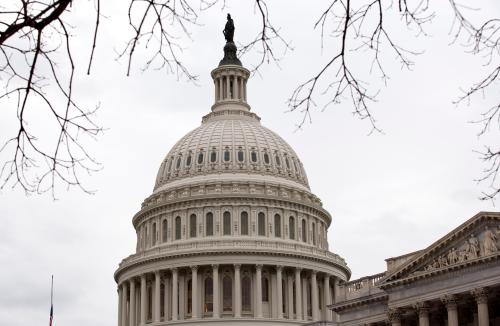
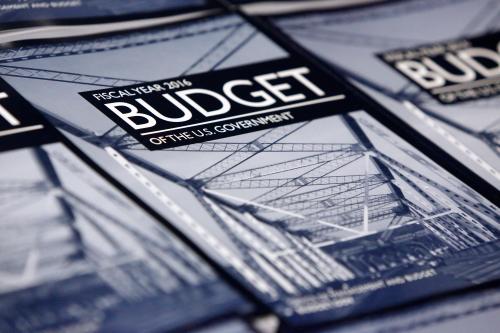





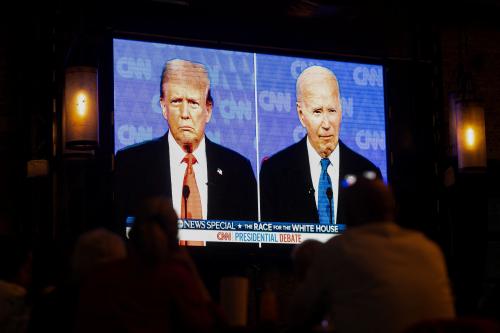
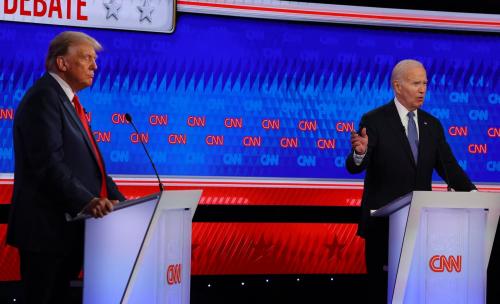
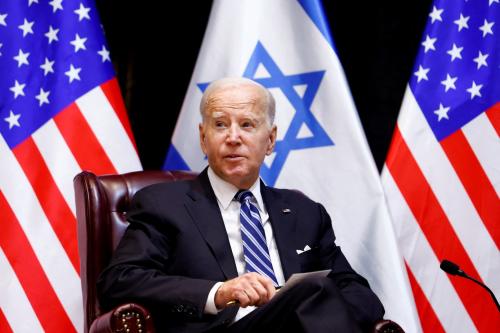
Commentary
Op-edHow President Trump can actually pass corporate tax reform
April 5, 2017